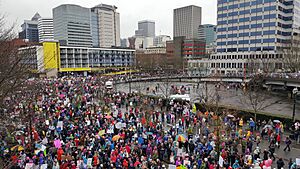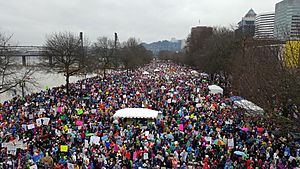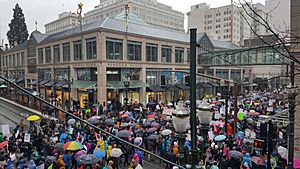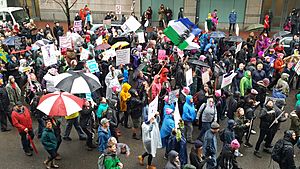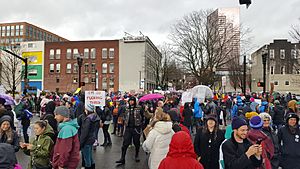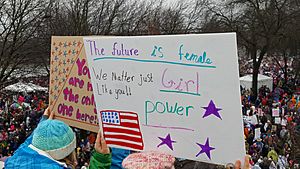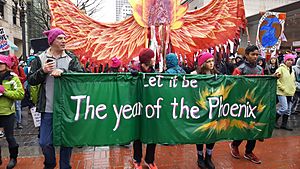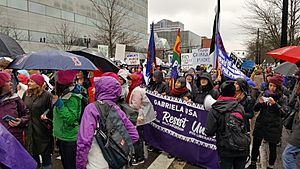Women's March on Portland facts for kids
Quick facts for kids Women's March on Portland |
|
|---|---|
| Part of 2017 Women's March | |
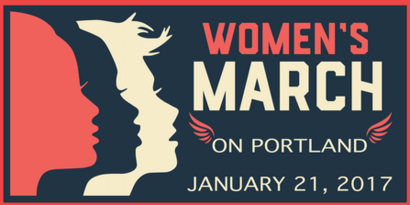
Promotional artwork for the event
|
|
| Date | January 21, 2017 |
| Location |
Portland, Oregon, United States
|
| Goals |
|
| Methods | Demonstration |
| Number | |
| Estimated 100,000 | |
The Women's March on Portland was a large event held in Portland, Oregon. It happened on January 21, 2017. This was the day after Donald Trump became president. The march was part of a bigger event called the 2017 Women's March. These marches took place in many cities across the United States.
This march in Portland was one of the biggest public protests in Oregon's history. About 100,000 people took part. No arrests were made during the event. It was a peaceful demonstration.
Plans for the Portland march started on November 11, 2016. A small group of women in Eastern Oregon began organizing it. This was right after the presidential election. Thousands of people quickly showed interest on social media. The first organizers wanted to focus on women's rights. However, some people felt they didn't include enough different groups.
Later, new organizers took over. They worked to make the march more welcoming to everyone. Margaret Jacobsen became the main organizer on January 6, 2017.
Contents
Why People Marched in Portland
Reasons for the Protest
Even though organizers didn't call it an "anti-Trump" event, many people marched to support women's rights. They also wanted to protest against Donald Trump.
A reporter named Shasta Kearns Moore said the march was a reaction to the election. She noted that many different groups felt they were not being heard.
The organizers shared a statement about the march's goal. They said it was to unite and empower everyone. This included people who supported women's rights, human rights, and immigrant rights. They also marched for civil liberties and social justice for all. They stressed it was a peaceful event. People marched in support of their rights, safety, and families. They believed diverse communities make the country strong.
How the March Happened
Planning the Event
Before the march, organizers thought 20,000 to 30,000 people would come. This would make it the biggest protest in Portland's history. Over 50,000 people had said online they planned to attend. Unlike some other marches, Portland's event had a permit. The route was also shared with the public beforehand.
Participants gathered near the Morrison Bridge. This was at Tom McCall Waterfront Park. Then, they marched through a 44-block area of downtown Portland. They returned to the park around noon. The route was about 1.3 to 2.2 miles long. Marchers finished near the Battleship Oregon Memorial. Most people had left by 3:30 PM.
Activities on March Day
Before the main march, there was a rally for children and families. It started at 11 AM. Speakers shared messages. There were also chants and songs. Safety tips were given, especially for families with kids. The protest was free to join. Organizers tried to raise money to cover costs. A pro-labor rally also happened before the march. About 150 people from that rally joined the Women's March.
Impact of the March
Crowd Size and Atmosphere
The march became one of the biggest public protests in Oregon's history. Organizers said 100,000 people attended. The Portland Police Bureau agreed it was one of the largest marches ever. They estimated between 50,000 and 100,000 people. News reports also gave estimates from 70,000 to 100,000.
The Portland Tribune newspaper said the event felt festive. So many people came that it was hard to see or hear the speakers. Thousands were still in Waterfront Park when the march officially began.
Local news reported a good relationship between marchers and police. The Portland Tribune said the march had a "carnival atmosphere" with many smiles. Police said the march was "100 percent peaceful." No arrests were made. Sergeant Pete Simpson praised the organizers. He said they worked with the city and police to plan the route. This helped ensure a smooth event.
Public Transportation and Traffic
TriMet, the local public transit agency, served a record number of people. MAX Light Rail trains had delays because so many people were using them. Shuttle buses helped riders move between stations. Bus services also faced delays and detours. The high demand even caused TriMet's ticketing app to stop working for a short time. MAX Light Rail services returned to normal around 3:45 PM. Traffic also built up on Interstate 5. Police blocked some roads near the park and bridge.
Who Organized the March
The Organizers' Journey
Four women in Eastern Oregon started planning the Portland march. This was on November 11, 2016. One of them made a Facebook page. Thousands of people quickly showed interest. About 600 volunteers signed up to help.
However, the first organizers faced challenges. Different groups wanted to focus on their specific issues. The original leaders wanted to keep the focus on women's rights. One organizer said it was about the "bigger picture."
The first organizers tried to include diverse voices. They had a speaker about rights for trans women. They also offered a chance for Black Lives Matter supporters to hold a "die-in." Still, some people criticized them for not doing enough about diversity. Arguments happened online. Moderators had to remove negative comments.
This conflict was not just in Portland. Similar disagreements happened in other cities. A local liaison to the national Women's March said this was common. Some people thought the disagreements were about how different generations view feminism.
On December 27, a new group took over the event's Facebook page. They created a new page called "Women's March on Washington: Portland." The first people invited to join this new group were those who had complained about the lack of diversity. The new group changed the original Facebook page to match their new event. Thousands more people then said they would attend.
Margaret Jacobsen, an activist and writer, joined the team on January 5, 2017. She became the main organizer the next day. Other organizers included Rebekah Brewis, Nora Colie, Erica Fuller, and Kat Lattimer.
The new organizers wanted to make the march welcoming for everyone. This included people of any age, gender, or physical ability. They stated that the Portland team worked hard to ensure the event was inclusive. They wanted the voices of women of color to be heard. The organizers, along with Mayor Ted Wheeler and Police Chief Michael Marshman, held a press conference. They talked about the importance of people being responsible for their own actions during the march.
Politicians' Involvement
Mayor Ted Wheeler called the march "an incredible day for Portland." He said it was a positive and family-friendly event. He supported people expressing their rights peacefully. He noted that Portland values being engaged and active.
Earl Blumenauer, a U.S. Representative for Oregon, attended the march. He chose to be there instead of at the presidential inauguration. Senator Ron Wyden attended the inauguration and the Women's March in Washington, D.C.
Images for kids
-
Marchers at Tom McCall Waterfront Park, south of the Morrison Bridge


